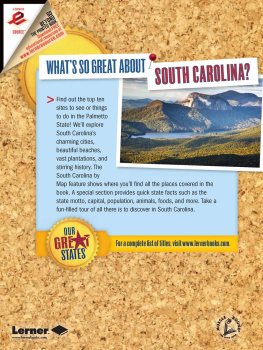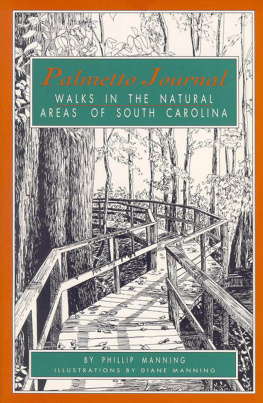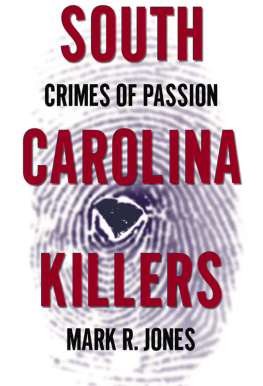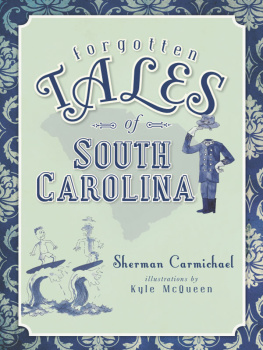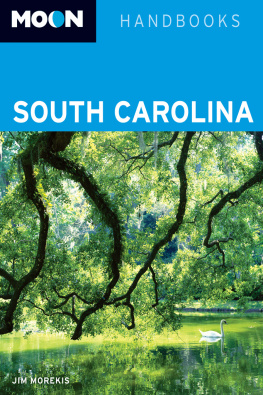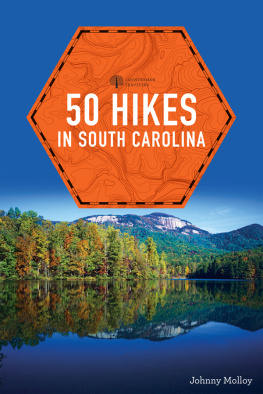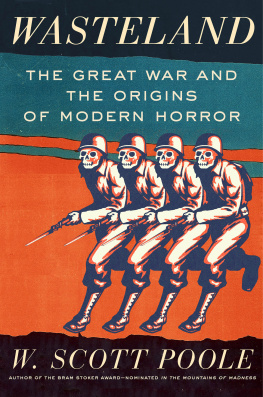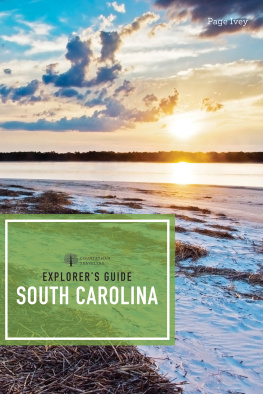THE PALMETTO STATE
The Making of Modern South Carolina
JACK BASS and W. SCOTT POOLE
The University of South Carolina Press
2009 University of South Carolina
Cloth edition published by the University of South Carolina Press, 2009
Paperback edition published by the University of South Carolina Press, 2012
Ebook edition published in Columbia, South Carolina,
by the University of South Carolina Press, 2012
www.sc.edu/uscpress
21 20 19 18 17 16 15 14 13 12 10 9 8 7 6 5 4 3 2 1
The Library of Congress has cataloged the cloth edition as follows:
Bass, Jack.
The Palmetto State : the making of modern South Carolina / Jack Bass and W. Scott Poole.
p. cm.
Includes bibliographical references and index.
ISBN 978-1-57003-814-3 (cloth : alk. paper)
1. South CarolinaHistory. 2. South CarolinaRace relationsHistory. 3. South CarolinaPolitics and government. 4. South CarolinaSocial conditions. I. Poole, W. Scott, 1971 II. Title.
F269.B269 2009
975.7dc22
2008054777
Portions of this book have been adapted, with permission, from Porgy Comes Home, by Jack Bass (Columbia, S.C.: R. L. Bryan, 1972).
ISBN 978-1-61117-132-7 (ebook)
ILLUSTRATIONS
ACKNOWLEDGMENTS
The origin of this book is a column, written in 2002 by Will Moredock for the Charleston City Paper, noting the fortieth anniversary of the publication of my book Porgy Comes Home. Moredock wrote that the book documents the quiet revolution that changed South Carolina between World War II and 1970. It seemed to me that this revolution has continued to shape the state in those forty years, and the story needed updating.
The idea of updating that volume morphed into a much longer narrative, a story of the Palmetto State that begins with the first European settlers. I subsequently invited W. Scott Poole, a younger historian and author who teaches South Carolina history and directs the joint graduate history program at the College of Charleston and the Citadel, to join me as coauthor. Scott and I have worked together since then to produce a book that will provide a solid understanding of and introduction to the state's history and development into the twenty-first century.
The emphasis the University of South Carolina Press has given in recent decades to publishing books about the state has significantly expanded the knowledge and understanding of South Carolina and its development. We are grateful for the press's attention to our book, with special mention of acquisitions editor Alexander Moore's role in shepherding this book to publication and project editor Karen Beidel's cheerful understanding and attention to detail.
Our special thanks are extended to Director Allen Stokes and to Beth Bilderback at the South Caroliniana Library of the University of South Carolina for their helpful support.
Special appreciation also goes to James R. Morris Jr., whose guidance, broad knowledge, and introductions led to numerous excellent sources, including officials and industry leaders important in the new economy that began taking off in 1970 in South Carolina. He symbolizes the many scholars and interviewees who gave of their time and insight.
The libraries and librarians of the College of Charleston provided excellent reference help. Their dean, David Cohen, read the manuscript and provided valuable insights.
Joi Mayo and Kate Jenkins, students in the master's program in history at the College of Charleston, assisted in the indexing of the volume, and their help is gratefully acknowledged.
Scott expresses his thanks to Beth Phillips for her love and support and his delight that their courtship and wedding interfered with the completion of this book. He also acknowledges his thanks and appreciation to his parents, Joan and Clarence Poole, for giving him a South Carolina childhood in the best sense of the phrase.
I would like to express my special appreciation to my wife, Nathalie Dupree, for her love, special support, and excellent copyediting. I also want to acknowledge my parents, Esther and Nathan Bass, of blessed memory, who brought forth their youngest child to grow into maturity as a native South Carolinian.
Scott and I dedicate this book to our parents.
JACK BASS
INTRODUCTION
South Carolinians began their fourth century looking not behind, but ahead. Yet, as William Faulkner observed, especially about the South, The past is never dead. It's not even past.
After vigorous statewide debate in 2000 over the Confederate battle flag and whether it symbolized heritage or hate, the legislature moved it from the State House dome, where it had flown for almost four decades, to a flagpole on the capitol grounds. A small step, perhaps, but important symbolicallya turn from the legends of heritage and toward historical truth. Its presence remained sufficiently provocative for the state NAACP that it launched a boycott.
A significant factor in the flag's removal from the dome came in a statement signed by more than one hundred historians in the state. They documented beyond doubt that the direct cause of the Civil War, so devastating for this state, was not the idea that a state had the right to determine its destiny. The issue was slavery. That historical truth cut down any attempt at a moral argument by flag proponents.
Then came the stunning revelation by Essie Mae Washington-Williams after the death of Senator Strom Thurmond, a complicated and iconic political figure who many identified as a symbol of allegiance to the state's racial past, that she, an African American, was his daughter. Her announcement was followed by a full acceptance of her by his South Carolina family. The addition of her name to those of his other children on a State House monument to Thurmond signaled acceptance of something new by the state as a whole.
Recognition began to develop that the legacy of good manners had provided both a veneer of civility and a cover of silence over a historic range of matters related to race and poverty that remained unaddressed. This developing recognition in itself reflected change and signaled a state in transition.
Not long before his death, author and philosopher James McBride Dabbs recalled that it was the traditional South Carolina emphasis on manners that first got him involved in civil rights. He was referring to 1944, when Governor Olin D. Johnston convened a special session of the legislature after federal courts threatened South Carolina's whites-only primary.
In an attempt to circumvent a Supreme Court decision, Johnston called the legislature into special session to pass bills that would allow the state Democratic Party to regulate the primary as a private club of whites. (Johnston would later receive strong black support as a U.S. senator with a liberal record on economic issues.)
I knew they couldn't succeed, Dabbs recalled. You couldn't set up a gentlemen's club. It was impossible; you knew they would get you sooner or later. He wrote a letter of protest that was published in South Carolina's largest newspaper, the State in Columbia. What really motivated me, Dabbs continued, what really got me was such bad manners, talking publicly about taking the vote from Negroes. I knew we had mistreated the Negro, but my mother taught me to be polite. This was very impolite, I thought, and I said so. South Carolina still has a good deal of this.




